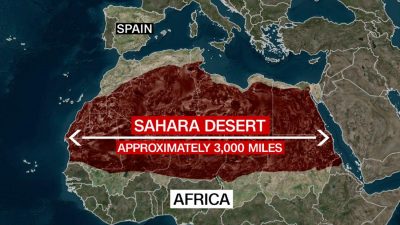Trump’s Sub-Saharan Border Wall Proposal and the Migrant Crisis

Trump supposedly made an imaginative suggestion to Spain that it build a wall across the Sahara desert to keep out illegal immigrants.
The Spanish Foreign Minister revealed that the American President even remarked that “the Sahara border can’t be bigger than our border with Mexico”, which drew much mockery in the Liberal-Globalist Mainstream Media because the peninsular country only has two very small enclaves in Africa that are located near northern Morocco’s mountains and not anywhere close to the Sahara desert. Instead of the gaffe that it’s being presented as, it could also be that Trump was deliberately drawing attention to a “politically incorrect” problem in his characteristically dramatic way. Spain’s new socialist government doesn’t really consider the country to be in any sort of Migrant Crisis, even though its geography makes it forever susceptible to this scenario.
The EU as a whole has finally gotten around to realizing that sub-Saharan Africa presents an immigration challenge many magnitudes greater than anything that Syria ever did, but it’s conflicted over how to preemptively address this and doesn’t seem to have any clear-cut plan. A few countries have dispatched military forces to transit states Mali and Niger for anti-terrorist purposes, while some are also considering paying these states and other regional ones to incentivize their governments to stop illegal immigrants at their borders instead of letting them cross through to North Africa and thenceforth Europe. A “hybrid solution” of sorts is for the EU to cut a Turkish-like migrant deal that includes a combination of so-called “disembarkation centers” and de-facto bribes, but it’s unclear how successful that would be if it’s ever even implemented.
What Trump’s suggestion seemed to imply is that more stringent border measures need to be in place as far away from Europe as possible in order to most successfully thwart these future immigrant waves, which would basically make Mali, Niger, and possibly also Mauritania, Chad, and Sudan the EU’s so-called “frontline states” instead of Spain, Italy, Malta, and Greece, but getting them to cooperate with any such plans will entail having to overcompensate them for the socio-political and financial costs that they’ll have to undertake in that case. This is a serious burden upon states that could ordinarily care less about dealing with this problem, and they’re also prone to resort to heavy-handed measures that contradict the EU’s “human rights” “gospel” if they even do choose to respond.
Ironically, the end result might be that the EU’s “democracy” and “human rights” “utopia” is ultimately upheld by Brussels bribing “anti-democratic” states to carry out “humanitarian crimes” against migrants.
*
Note to readers: please click the share buttons above. Forward this article to your email lists. Crosspost on your blog site, internet forums. etc.
This article was originally published on Oriental Review.
Andrew Korybko is an American Moscow-based political analyst specializing in the relationship between the US strategy in Afro-Eurasia, China’s One Belt One Road global vision of New Silk Road connectivity, and Hybrid Warfare. He is a frequent contributor to Global Research.

